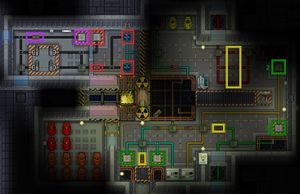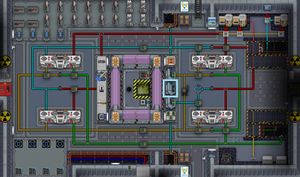Difference between revisions of "Supermatter Engine ErisEn"
Jack Frost1 (talk | contribs) m (→Quickstart) |
|||
| Line 5: | Line 5: | ||
[[File:Eris-SM-Guide-Computer.jpg|thumb|right|You'll need this computer.]] |
[[File:Eris-SM-Guide-Computer.jpg|thumb|right|You'll need this computer.]] |
||
| − | # Wrench canisters in ports in green squares. |
+ | # Wrench canisters in ports in green squares. Recommended to use plasma for both - the vastly higher specific heat (10x that of nitrogen) makes it ideal for generating lots of power while minimizing risk of delamination. |
| − | # |
+ | # Max out the pumps marked in yellow so that the gas flows freely through the loops. |
| − | # Set up omni-filters in red squares. Set it to filter |
+ | # Set up omni-filters in red squares. Set it to filter plasma - or, if you've decided to use another gas in the hot loop (marked 1) set it to that instead. It'll pump the filtered gas back into the loop and send everything else to the waste canister. Max the pump marked red, and wrench an empty canister onto the marked port. |
| − | # |
+ | # Wrench a Nitrogen canister to the port in the purple square and turn the purple pump to max. |
| − | # Head to the only computer on the lower level. Search for the inject port. |
+ | # (Optional - it functions fine without doing this, but the console allows for finer control) Head to the only computer on the lower level. Search for the inject port. |
| − | # Repeat the search for injection port on the computer in the cyan rectangle. |
+ | # (Optional - see above) Repeat the search for injection port on the computer in the cyan rectangle. |
| − | # Once the canisters in the green squares are empty, replace with four more canisters of the |
+ | # Once the canisters in the green squares are empty, replace with four more canisters of the same gas. |
| + | # (Optional) Label the now empty canisters as CAUTION so they can be easily identified. |
||
# Be sure to use the RCON console (found in the room with the computer in the cyan square) to turn on substations that are off back on and allocate more or less power to substations that need it. |
# Be sure to use the RCON console (found in the room with the computer in the cyan square) to turn on substations that are off back on and allocate more or less power to substations that need it. |
||
# (Optional) Double check everything. |
# (Optional) Double check everything. |
||
| + | # Turn on the emitter. |
||
| − | # Start SM. |
||
| ⚫ | |||
| − | Usually you don't want your EER be too high, so use about 12-16 emitter shots for Nitrogen setup. It will eventually get lower, so check it sometimes. |
||
| ⚫ | |||
| − | TEG power output depends on |
+ | TEG power output depends on the difference between the temperature of the loops, and the heat capacity of the gas mix in the loops. While the hot loop doesn't get particularly hot with a pure plasma setup, it still generates vastly more power due to the high heat capacity, meaning it's bother safer and outputs more energy. |
It's also a good idea to upgrade the two SMES units (the ones side by side in the computer picture) using the parts in one of the crates south of them. |
It's also a good idea to upgrade the two SMES units (the ones side by side in the computer picture) using the parts in one of the crates south of them. |
||
| − | Remember to download the shield modification program to turn on the shields and explore the extra options as well as tinkering with the input cap |
+ | Remember to download the shield modification program to turn on the shields and explore the extra options as well as tinkering with the input cap. Enabling the engineering section bypass allows the SMES units to charge the shields much faster, and is recommended - but it might be best left till later, as it can be a bit of a power hog while it charges to maximum capacity. |
| + | |||
| + | Entering the lower floor once the engine has started should be avoided unless absolutely necessary - the supermatter emits an EXTREME amount of radiation, and it's even been seen to penetrate full protection. |
||
== Basic Principles == |
== Basic Principles == |
||
| Line 32: | Line 34: | ||
=== Gas Loops === |
=== Gas Loops === |
||
There are two gas loops in the engine, the cold loop and the hot loop. By mixing in the generator, the temperature of the gasses are equalized somewhat, so the hotter gas should be reheated, and the cooler gas should be cooled. This is where the supermatter comes in. The cold loop flows from red pipe, to generators, to the green pipe, then out to radiators in space to cool back down. The hot loop flows from yellow pipe, to blue pipe, then into the supermatter chamber to be reheated. The supermatter, when excited, produces a large amount of heat, and will probably burn some of the plasma in the hot loop. In order to remove the products of this combustion, everything except plasma is filtered from the hot loop. |
There are two gas loops in the engine, the cold loop and the hot loop. By mixing in the generator, the temperature of the gasses are equalized somewhat, so the hotter gas should be reheated, and the cooler gas should be cooled. This is where the supermatter comes in. The cold loop flows from red pipe, to generators, to the green pipe, then out to radiators in space to cool back down. The hot loop flows from yellow pipe, to blue pipe, then into the supermatter chamber to be reheated. The supermatter, when excited, produces a large amount of heat, and will probably burn some of the plasma in the hot loop. In order to remove the products of this combustion, everything except plasma is filtered from the hot loop. |
||
| + | Oxygen in the hot loop is a very bad idea - it leads to fires, which can rapidly raise the core temperature to dangerous levels. |
||
Revision as of 18:46, 23 April 2019
The supermatter is the core of power generation aboard the Eris. Don't touch, or even look at it unprotected.
Quickstart
- Wrench canisters in ports in green squares. Recommended to use plasma for both - the vastly higher specific heat (10x that of nitrogen) makes it ideal for generating lots of power while minimizing risk of delamination.
- Max out the pumps marked in yellow so that the gas flows freely through the loops.
- Set up omni-filters in red squares. Set it to filter plasma - or, if you've decided to use another gas in the hot loop (marked 1) set it to that instead. It'll pump the filtered gas back into the loop and send everything else to the waste canister. Max the pump marked red, and wrench an empty canister onto the marked port.
- Wrench a Nitrogen canister to the port in the purple square and turn the purple pump to max.
- (Optional - it functions fine without doing this, but the console allows for finer control) Head to the only computer on the lower level. Search for the inject port.
- (Optional - see above) Repeat the search for injection port on the computer in the cyan rectangle.
- Once the canisters in the green squares are empty, replace with four more canisters of the same gas.
- (Optional) Label the now empty canisters as CAUTION so they can be easily identified.
- Be sure to use the RCON console (found in the room with the computer in the cyan square) to turn on substations that are off back on and allocate more or less power to substations that need it.
- (Optional) Double check everything.
- Turn on the emitter.
Plasma setup can withstand EER up to 1500+. You can simply just leave emitter on since it's bottlenecks at ~1400. Setups with other gases aren't as safe - you'll want to do a few shots, maybe 6-12 depending on the gas.
TEG power output depends on the difference between the temperature of the loops, and the heat capacity of the gas mix in the loops. While the hot loop doesn't get particularly hot with a pure plasma setup, it still generates vastly more power due to the high heat capacity, meaning it's bother safer and outputs more energy.
It's also a good idea to upgrade the two SMES units (the ones side by side in the computer picture) using the parts in one of the crates south of them.
Remember to download the shield modification program to turn on the shields and explore the extra options as well as tinkering with the input cap. Enabling the engineering section bypass allows the SMES units to charge the shields much faster, and is recommended - but it might be best left till later, as it can be a bit of a power hog while it charges to maximum capacity.
Entering the lower floor once the engine has started should be avoided unless absolutely necessary - the supermatter emits an EXTREME amount of radiation, and it's even been seen to penetrate full protection.
Basic Principles
The Generators
The core power generation is done by the Thermo-Electric Generators (TEGs). There are four in the engine, and they are powered by the flow of two gasses of differing temperature through their two sides. The larger the temperature difference, the more power generated. Note that they are less efficient when generating more than 500kW, but are not harmed by doing so, despite the intermittent sparks generated.
Gas Loops
There are two gas loops in the engine, the cold loop and the hot loop. By mixing in the generator, the temperature of the gasses are equalized somewhat, so the hotter gas should be reheated, and the cooler gas should be cooled. This is where the supermatter comes in. The cold loop flows from red pipe, to generators, to the green pipe, then out to radiators in space to cool back down. The hot loop flows from yellow pipe, to blue pipe, then into the supermatter chamber to be reheated. The supermatter, when excited, produces a large amount of heat, and will probably burn some of the plasma in the hot loop. In order to remove the products of this combustion, everything except plasma is filtered from the hot loop. Oxygen in the hot loop is a very bad idea - it leads to fires, which can rapidly raise the core temperature to dangerous levels.


